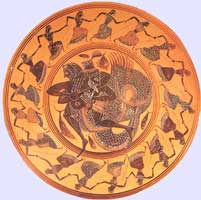
Heracles and Triton, Tarquinia RC 4194
Triton is a Greek god, the messenger of the deep. He is the son of Poseidon, god of the sea, and Amphitrite. He is usually represented as a merman, having the upper body of a human and the tail of a fish.
Like his father, he carried a trident. However, Triton's special attribute was a twisted conch shell, on which he blew like a trumpet to calm or raise the waves. Its sound was so terrible, that when loudly blown, it put the giants to flight, who imagined it to be the roar of a mighty wild beast (Hyginus, Poet. astronom. ii. 23).
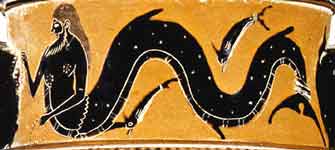
Triton, Black Figure Vase (From a Texas University Lecture)
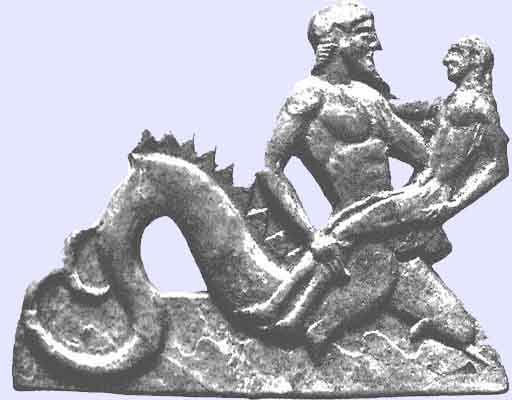
Triton with a boy (Theseus ?), 460 BC, Melos (P. Jakobsthal, Die melischen Reliefs)
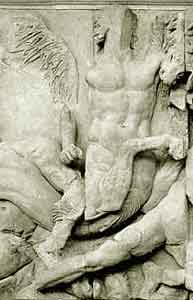
Triton hits with his horselike hoof a giant, Pergamon Zeus Altar Gigantomachy
According to Hesiod's Theogony, Triton dwelt with his parents in a golden palace in the depths of the sea. The story of the Argonauts places his home on the coast of Libya. When the Argo was driven ashore on the Lesser Syrtes, the crew carried the vessel to Lake Tritonis, whence Triton, the local deity, guided them across to the Mediterranean (Apollonius Rhodius iv. 1552).
Triton also appeared in Roman myths and epics. In the Aeneid, Misenus, the trumpeter of Aeneas, challenged Triton to a contest of trumpeting. The god flung him into the sea for his arrogance.

Over time, Triton's name and image came to be associated with a class of merman-like creatures, the Tritons, which could be male or female, and usually formed the escort of marine divinities. Ordinary Tritons were described in detail by the geographer Pausanias (ix. 21). A variety of Triton, the Centauro-Triton or Ichthyocentaur ("Fish-centaur"), was described as having the forefeet of a horse in addition to the human body and the fish tail. It is probable that the idea of Triton owes its origin to the Phoenician fish-deities.
Among the things named after Triton include Triton, the largest moon of the planet Neptune. This name is symbolic, as Neptune is the Roman name for Triton's father.
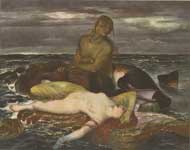
Triton and Nereid , Arnold Böcklin, 1875 (third version)

Thetis with a Triton , Massimo
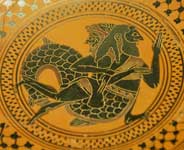
Heracles fighting Triton, BM GR1947-7-14-16
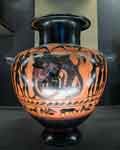
Hydria Heracles fighting Triton Louvre F51
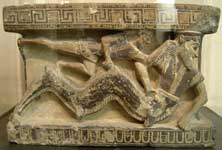
Arula, Front panel (Heracles and Triton)
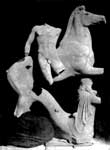
One of the Dioscuri on a horse carried by a Triton, Sicily 5th c. BC
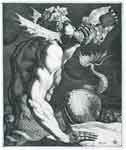
Triton , Jacques de Gheyn (III) - ca.1615
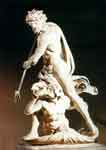
Triton and Nereid, 1877, Arnold Böcklin, Oskar Reinhart Foundation, Winterthur
Links
http://www.oxfordradcliffe.nhs.uk/findus/ri.aspx - Images of a statue of Triton in the fountain in the forecourt of the
Radcliffe Infirmary Hospital in Oxford, UK.
Greek MythologySee also : Greek Mythology. Paintings, Drawings
Retrieved from "http://en.wikipedia.org/"
All text is available under the terms of the GNU Free Documentation License
| Ancient Greece
Science, Technology , Medicine , Warfare, , Biographies , Life , Cities/Places/Maps , Arts , Literature , Philosophy ,Olympics, Mythology , History , Images Medieval Greece / Byzantine Empire Science, Technology, Arts, , Warfare , Literature, Biographies, Icons, History Modern Greece Cities, Islands, Regions, Fauna/Flora ,Biographies , History , Warfare, Science/Technology, Literature, Music , Arts , Film/Actors , Sport , Fashion --- |

